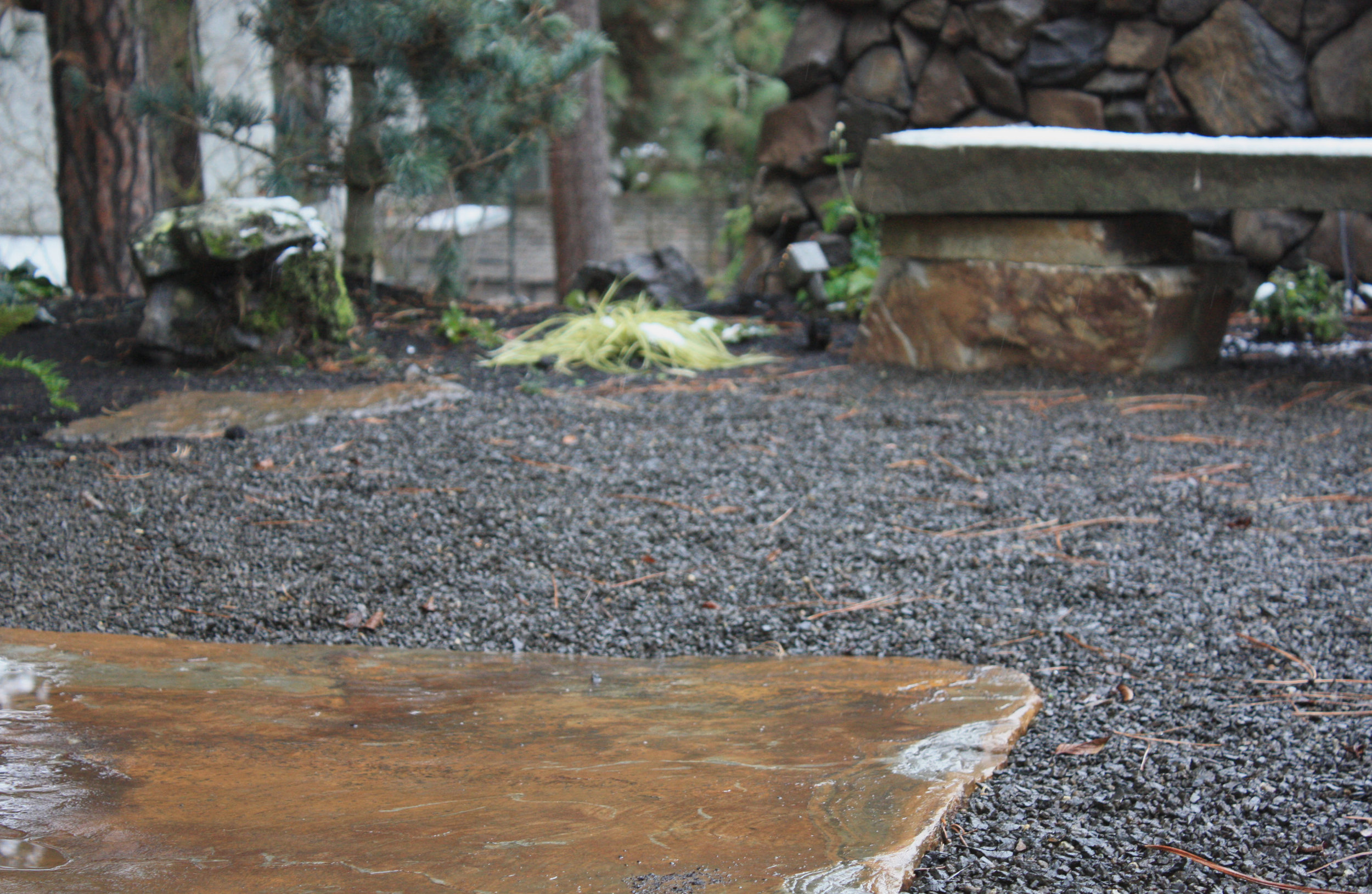Gravel is a great, low-impact material for patios and pathways. It is less expensive than solid materials like concrete, pavers, or flagstone; is quick to install; and has many environmental benefits over solid surfaces. The type of gravel used affects the function of the space, but it can also impact the overall aesthetic. A speckled gray gravel can evoke a zen garden feel, golden decomposed granite conjures Tuscan themes, and dark lava rock harkens back to mid-century landscapes. Here’s an overview of a few gravel options to consider for a gravel path or patio.
Pea Gravel
Pea gravel is a popular material because it is inexpensive and comes in a variety of colors and sizes. It’s composed of rounded pebbles, so it is comfortable for pets or bare feet to walk across. Because of its round shape, however, pea gravel can’t be compacted into a smooth surface. Individual pebbles simply shift against one another when force is applied, like plastic balls in a ball pit. Just as a child jumping into a ball pit will plunge down beneath the surface, your feet, furniture legs, and trash can wheels will similarly displace pea gravel as they press down. This makes pea gravel a poor choice for patios, where it will impede the movement of people and furniture, and a high maintenance choice for paths, where it will require frequent smoothing and cleanup of stray pebbles that have been inadvertently flung out of place.
Basalt Chip
Basalt is a dark, volcanic rock that is plentiful across the Inland Northwest, thanks to lava flows that blanketed the region a few million years ago, making it a fairly affordable choice in the region today. The rock is fairly uniform in color, which makes it ideal for understated use in the landscape. Basalt comes in many sizes, from cobbles several inches across to small gravel of less than half an inch. Because of the texture of the rock, chipped basalt breaks into jagged, angular pieces. While this can be uncomfortable on bare feet, it does mean that the edges of the gravel pieces will lock together when compacted. This allows you to create a much stronger surface than pea gravel, as the individual chips do not shift and travel in the same way as round pebbles. Smaller-sized basalt chip will create a smoother, flatter patio, but the smaller pieces can also be more painful to step on.
Crushed Granite
Like basalt, granite is a volcanic rock that is fairly common throughout the Spokane/Coeur D’Alene region. Its texture is very different, however, with large crystals of different colored minerals. In addition to giving crushed granite a very different look than basalt chip, those large crystals provide a coarse network of joints at which the granite breaks apart when crushed. This results in gravel with fewer sharp edges, and those edges that remain wear down more easily than basalt would. Even a granite pebble without sharp edges will have many bumps and ridges that allow it to lock against surrounding pebbles when compacted, making it a very good choice for gravel pathways and patios. In our area, it is usually close to basalt in price, but that will vary across the country depending on local supply.
Decomposed Granite
Decomposed granite offers a compromise between the comfortable feel of pea gravel and the structural integrity of basalt chip or crushed granite. As granite ages, the individual crystals and minerals break apart, forming a material with particles that range from rock dust to very small rounded pebbles that won’t stab a bare foot or paw. A decomposed granite patio or pathway is usually more expensive than using a similar crushed granite, but the small and varied particles compact down to a very strong and stable surface, comparable to a solid product. This means that decomposed granite has much less maintenance than other gravel products, while also being much more comfortable to walk on and use as a patio.
While all gravel patio and path options are more affordable and offer environmental benefits over solid products like concrete or pavers, they counter that somewhat with their increased maintenance. The level of maintenance will certainly vary by material and application, but in general a more expensive material like decomposed granite will need much less repair and replenishing than a material like pea gravel. Each person’s needs and budget will dictate which type of gravel patio is appropriate for their landscape. If you think a gravel patio might be a good choice for your landscape, contact us to look at your options.


